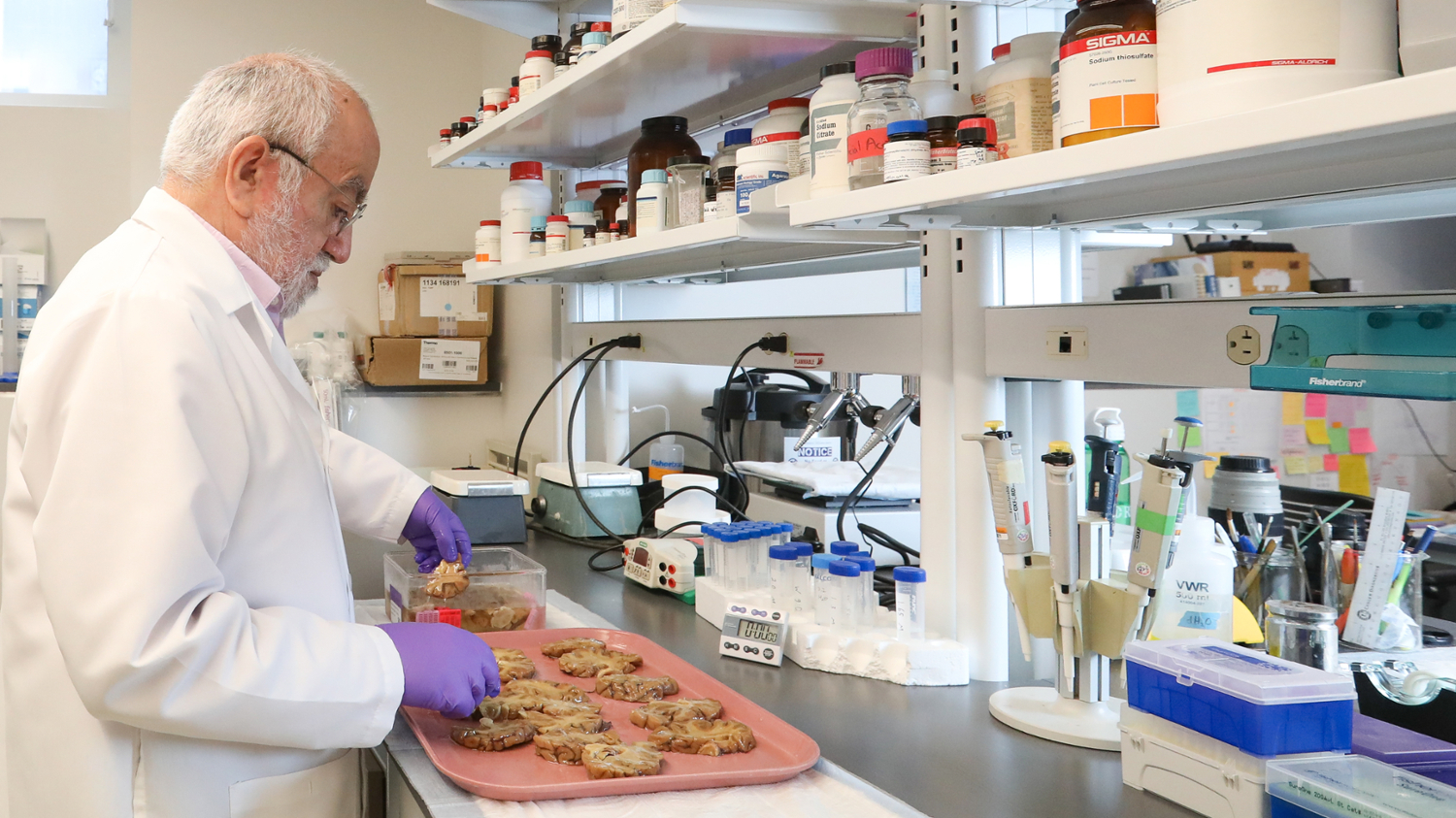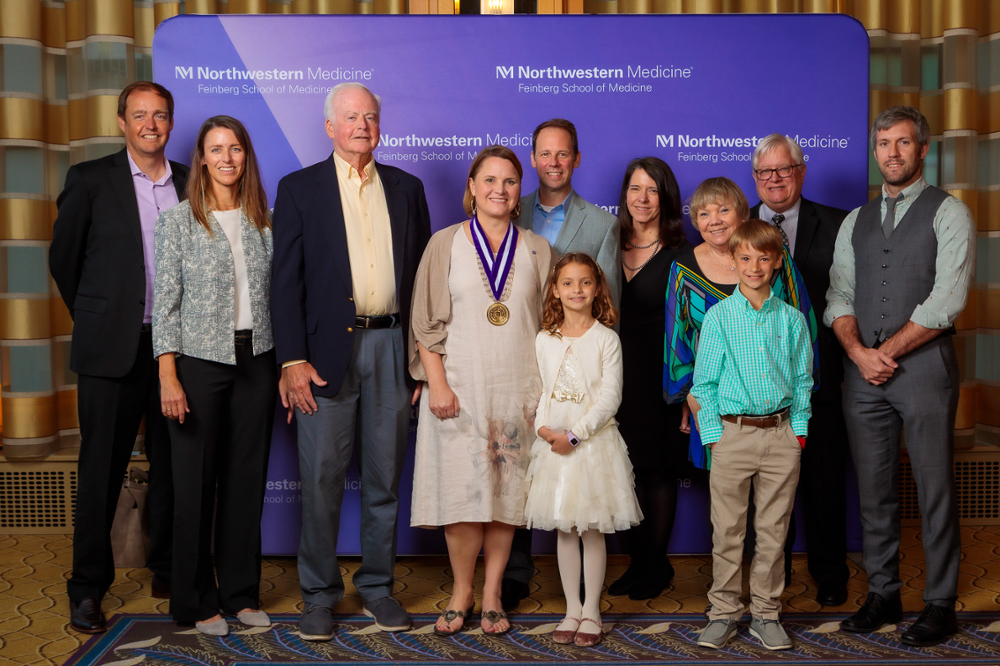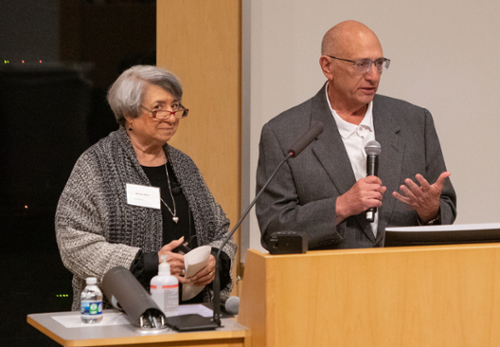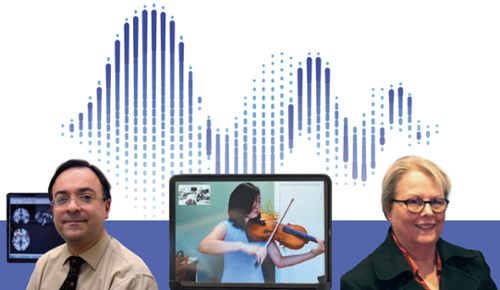Mesulam Supporters Propel Innovative Dementia Research and Programs

This story was published in the September 2022 issue of The Philanthropist, a newsletter for supporters and friends of Northwestern University Feinberg School of Medicine. Read the whole issue here.
Pictured above: Changiz Geula, PhD, research professor in the Mesulam Center, studies brain tissue in his laboratory.
Dedicated scientists, physicians, and social workers at Feinberg’s Mesulam Center for Cognitive Neurology and Alzheimer’s Disease are tackling dementia disorders from all angles. They are treating patients’ symptoms in creative ways, while studying the underlying factors that allow these devastating diseases to affect the mind and behavior. Better understanding of the complex neurobiology of the brain may someday lead to cures. As part of an academic health center, the Mesulam Center team translates what they learn through research to patients and families, as well as trainees who will carry this work forward to treat a rapidly aging US population.
The Mesulam Center is named in honor of its director, Marsel Mesulam, MD, the Ruth Dunbar Davee Professor of Neuroscience. Dr. Mesulam joined Northwestern 28 years ago to start a unique program focused on the neurobiology of brain aging and dementias that has flourished into today’s robust center.
SuperAging Study Turns Dementia Research Upside-Down

Scientists believe the average person’s memory peaks in their 30s and begins to decline thereafter. SuperAgers follow a different trajectory. These men and women over the age of 80 have the mental faculties of people 20 to 30 years younger. How? Emily Rogalski, PhD, has been studying SuperAgers for over a decade and revealed fascinating findings about their brains and lives.
For example, Dr. Rogalski has found that SuperAgers vary in education, wealth, and lifestyle factors like alcohol use or exercise. But they all have more Von Economo neurons— specialized brain cells thought to be important for social interaction—and slower cortical thinning compared to normal aging adults. SuperAgers also report more positive relationships with others than other peers their age.
“Understanding the biology, psychology, and social aspects of SuperAging may provide practical leads for avoiding or treating dementia and Alzheimer’s disease and living well into older age,” explained Dr. Rogalski, the Ann Adelmann Perkins and John S. Perkins Professor of Alzheimer’s Disease Prevention. “We’re turning a complex problem on its head and looking at it from a different perspective.”
Dr. Rogalski’s work is funded by the National Institutes of Health and through philanthropy, including her endowed professorship. John Perkins made a generous gift to establish the Perkins Professorship last year to honor his wife, Ann, who passed away from Alzheimer’s disease in early 2021. The couple met as undergraduate students at Northwestern.
Endowed professorships established by committed philanthropists create reliable, long-term support for faculty to initiate pioneering research, develop stronger teaching programs, invest in new technologies, and maintain laboratories and other physical assets.
“I am humbled by Mr. Perkins’ support—and inspired by Ann’s story and the experiences of so many SuperAgers and people living with Alzheimer’s and related dementias who I have met through my work,” said Dr. Rogalski, also a professor of Psychiatry and Behavioral Sciences and associate director of the Mesulam Center.
Mr. Perkins traveled to Chicago from California in May to celebrate Dr. Rogalski’s appointment as the inaugural holder of the Perkins Professorship.
“I enjoyed meeting Dr. Rogalski and learning more about her important work within the Mesulam Center,” Mr. Perkins said. “It is my hope that funding a professorship at Feinberg will be a lasting and meaningful way of honoring my late wife, Ann, and our mutual alma mater while also contributing to progress in fighting Alzheimer’s disease.”
Buddy Program Fosters Relationships Between Patients and Students

In addition to conducting research and treating the clinical characteristics of neurodegenerative diseases, the Mesulam Center focuses on quality of life for people diagnosed with dementia and their families. In 1997, Darby Morhardt, PhD, developed the Buddy Program based on the premise that individuals with dementia can still have meaningful social relationships, and even serve as mentors. Today known as the Glen and Wendy Miller Family Buddy Program, the program pairs first-year medical students at Feinberg and people living with early- stage dementia for a mutually-enriching experience.
Glen and Wendy Miller and their daughter, Lauren, know the effects of dementia well. Mrs. Miller was the primary caregiver for her mother, Marcy Raftenberg, for 17 years after she was first diagnosed with Alzheimer’s disease. After Mrs. Raftenberg passed away, the Millers wanted to improve quality of life for others suffering from the disease and their families. They began supporting the Buddy Program in 2008 through the Glen and Wendy Miller Family Foundation.
“Exposing young and upcoming doctors to Alzheimer’s patients and their families has long-range benefit for the doctors, the patients, and the patient’s family,” said Mrs. Miller during a speech at this year’s annual Alzheimer Day symposium. “With the increasing numbers of individuals living longer, we know that Alzheimer’s will increasingly affect our world. Thanks to Darby, future doctors will be better prepared to address the challenges of this dreaded disease. We are very proud to be associated with the Buddy Program and with the Mesulam Center.”
Through the Buddy Program, students get to know someone with dementia, while that person and their family get to share their experiences with the illness through regular meetings and activities together.
“I think the Buddy Program excels at emphasizing the humanism of medicine. It’s important to always keep in mind that we should see patients as people first, before diagnoses,” shared Brynn Carlson, a second-year medical student who participated in the program last year.
The Millers’ support to the Mesulam Center has had a wide impact at Northwestern— and beyond.
“The Millers embrace the spirit of the Buddy Program. Among their many contributions, they were instrumental in our ability to engage 15 different universities in replicating the program,” said Dr. Morhardt, a research professor in the Mesulam Center, during Alzheimer Day. “Thank you for the very special light that you give to this work and for your dear friendship.”
Music Therapy Brings Remarkable Benefits to People with Cognitive Impairments

A classically trained pianist, Borna Bonakdarpour, MD, started exploring how music interventions could help his patients with cognitive impairments early in his medical career.
Today, he runs the Northwestern Music and Medicine Program, providing and studying music therapies for patients diagnosed with Alzheimer’s disease, dementia, aphasia, and other neurological conditions. It’s a unique premise that has drawn national media attention, though more research is needed to understand how music affects the brain and the best ways to deliver the therapy.
Gail Belytschko, ’71 MD, ’75 ’76 GME, a retired neurologist active in Chicago’s music community, understood the potential benefits of music therapy as soon as she heard about it and decided to make a generous donation to support Dr. Bonakdarpour’s work.
“So much funding is directed toward pharmaceuticals and other therapeutic modalities,” said Dr. Belytschko. “Borna is taking an unconventional, creative approach that could be very beneficial for patients. Our world needs therapies besides drugs with potentially harmful side effects to help people with dementia.”
In one study conducted in 2020, the team tested music therapy for 87 hospitalized neurology patients who were not allowed visitors because of the COVID-19 pandemic. Dr. Bonakdarpour’s partner, violist, and music practitioner Clara Takarabe, played private performances for each patient via FaceTime. Ninety-eight percent of participants highly agreed that the intervention improved their emotional state, and electroencephalograms that measure brainwaves connected to five of the patients confirmed that their brains relaxed.
“For many patients with dementia or other neurologic diseases, the areas of the brain dedicated to music processing are undamaged. We can use music and those unharmed areas of the brain to help patients recover some of the abilities they’ve lost, like speech or movement, and to improve the psychological effects of their diseases,” said Dr. Bonakdarpour, assistant professor of Neurology and a member of the Mesulam Center. “I am truly grateful to Dr. Belytschko for enabling me and my team to harness the power of music to help patients.”
For more information about supporting the Mesulam Center for Cognitive Neurology and Alzheimer’s Disease, please contact Jordan Sund at jordan.sund@northwestern.edu or 312-503-2706.